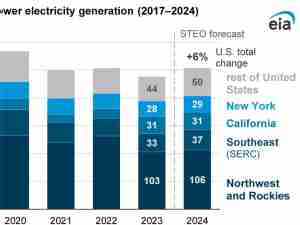Germany for decades led on well-engineered combustion cars. It’s now facing a watershed year in the quest to retain an edge in the age of electric vehicles.
Europe’s biggest economy is under growing pressure to retool dozens of fossil fuel-era factories employing tens of thousands of workers in a race for clean-technology leadership with the US and China. Volkswagen, Mercedes-Benz and BMW are rolling out several new battery-powered models in the coming months that will be pivotal to proving they can finally start to narrow the gap to Tesla and China’s BYD, the two clear leaders in EV sales. At stake is nothing less than Germany’s future as a global industrial powerhouse.
The task looks more complicated than ever. The war in Ukraine has whipsawed energy prices in Germany, which had to turn its Russia-reliant energy policy on a dime. China, which is emerging from lockdowns, has built a sizable lead processing the raw materials underpinning the EV revolution. Its homegrown carmakers — propped up with huge sums of state support — are now expanding in Europe.
The latest threat has cropped up in the US, where President Joe Biden is luring EV suppliers with $370 billion worth of clean-technology subsidies in the Inflation Reduction Act. Tax credits incentivizing the assembly of battery cells and packs are so generous that the US has the potential to become the most profitable location in the world for production, UBS analysts said last year.
Calls on Germany and the European Union to respond in kind are getting louder by the day. The threat posed by the IRA has been a recurring topic in talks at the World Economic Forum’s annual gathering in Davos this week, with several European leaders demanding more aggressive subsidies at home. They’re unhappy about the US’s approach, which they say favors American firms and puts their EU rivals at a disadvantage.
Interestingly, Chancellor Olaf Scholz hasn’t complained much, despite having as much to lose as anyone. The automotive industry employs around 786,000 people in Germany and is the country's biggest in terms of investments, sales and exports. Any setbacks for the nation’s carmakers and their suppliers would reverberate throughout the wider German economy.
In an interview with Bloomberg News Editor-in-Chief John Micklethwait this week, Scholz struck a conciliatory tone, saying his government appreciates and broadly supports what Biden is trying to achieve, and is “working very hard to avoid” a trade war. That’s understandable, given Germany’s reliance on exports. But the consequences of missteps remain — just ask the UK, which is reeling from the collapse of Britishvolt, a company the government was counting on becoming a big domestic battery player.
Berlin last week pledged an additional €1 billion ($1.1 billion) for battery projects as part of a larger European aid package, but that’s dwarfed by what the US is offering. BloombergNEF has tracked almost $28 billion in new electric mobility-related investment announcements in North America since the IRA passed in August. Europe’s best hope for a homegrown battery startup, Sweden’s Northvolt, is considering delaying plans for a major cell factory in Germany, and instead expanding first in North America.
Germany won’t completely miss out. China’s CATL, the world’s biggest maker of EV batteries, has started production at its first European cell plant in the eastern German city of Erfurt. Volkswagen is building a battery factory in Salzgitter that will be able to produce 40 gigawatt-hours of cells per year, enough for roughly 500,000 EVs.
But the country’s carmakers still have a ways to go in convincing drivers to buy into their EV shift. Tesla last week made deep price cuts in the US and Europe, on the heels of two rounds of reductions in China. Those are signs Chief Executive Officer Elon Musk is willing to act aggressively to keep the company growing.
Musk’s erratic behavior in recent months may create an opening for mass manufacturers like Volkswagen, but the German giant needs to fix software issues that have recently put off buyers. Both BMW and Mercedes have made messes recently with their attempts to squeeze owners for more money to unlock software-enabled features. All three manufacturers need to sort out supply chain issues that have contributed to declining sales.
Germany and Europe “risk falling behind” in the global race for clean mobility, Hildegard Müller, who heads Germany’s VDA auto lobby, said last week, after the country’s carmakers met with Scholz in the chancellery. “Berlin and Brussels must ensure Europe's competitiveness as quickly as possible.”










